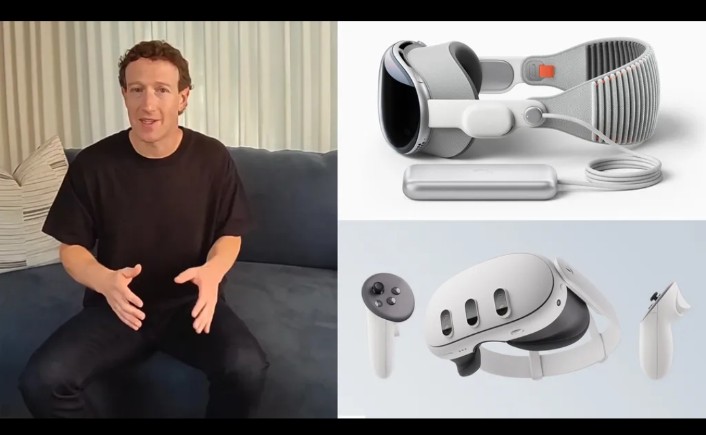Analyzing the Faceoff: Apple Vision Pro vs. Meta Quest 3

Introduction:
Mark Zuckerberg’s recent evaluation of the Apple Vision Pro has sparked intense discussions within the tech community, shedding light on the evolving dynamics of mixed reality. As the CEO of Meta, Zuckerberg’s detailed comparison with Meta’s Quest 3 has brought forth crucial distinctions, triggering debates on aspects such as price, design, display, content, and the fundamental differences in ecosystems.
Thank you for reading this post, don't forget to subscribe!

Price and Value:
Zuckerberg underscored the notable price disparity between the two headsets, positioning the Quest 3 as a more budget-friendly choice for the majority of consumers. He suggested that the Vision Pro’s higher price is tailored for tech enthusiasts seeking a premium experience with Apple’s spatial computing platform.

Design and Comfort:
Critiquing the Vision Pro’s weight and wired setup with an external battery, Zuckerberg commended the Quest 3 for its lighter build and wire-free design, promoting superior comfort and mobility during use.
Display and Audio Quality:
Acknowledging the Vision Pro’s impressive 4K Micro OLED displays and dual-driver audio pods, Zuckerberg highlighted the Quest 3’s broader field of view and brighter screen, framing it as a trade-off between the two headsets in terms of display and audio capabilities.
Content and Integration:
Zuckerberg pinpointed the Quest 3’s richer content library and criticized the Vision Pro for limitations in gaming and social experiences. He also underscored the seamless integration of the Vision Pro with other Apple hardware and services, presenting it as an advantage for users deeply entrenched in the Apple ecosystem.
Open vs. Closed Ecosystems:
Touching on the broader debate between open and closed ecosystems, Zuckerberg positioned Meta as an advocate for an open model in contrast to Apple’s more controlled approach. This philosophical difference, he suggested, plays a crucial role in the ongoing competition between the two companies in the mixed reality space.
Conclusion:
Zuckerberg’s assessment of the Vision Pro is unequivocally critical, with a firm endorsement for the Quest 3 as “the superior product, unequivocally.” The ensuing discourse reflects historical rivalries in the tech industry and prompts relevant questions about the trajectory of virtual and mixed reality technologies. While the Vision Pro garners commendation for its high-resolution display and integration with Apple’s ecosystem, the Quest 3’s affordability, comfort, and diverse content library position it as an appealing choice for a wider consumer base.
As the mixed reality landscape unfolds, Zuckerberg’s critique adds an intriguing layer to the ongoing narrative of innovation and competition, leaving enthusiasts and tech observers eager to witness how these divergent visions for the future of technology will play out.
keywords- Apple Vision Pro, Meta Quest 3, Mark Zuckerberg review, mixed reality, spatial computing, headset comparison, tech community, price difference, design critique, display quality, audio capabilities, content library, ecosystem philosophy, open vs. closed ecosystems, technology competition, virtual reality, augmented reality, mixed reality landscape, tech industry rivalry, innovation, affordable VR, immersive experiences, spatial computing platform, technology enthusiasts, tech discourse, future of technology.
